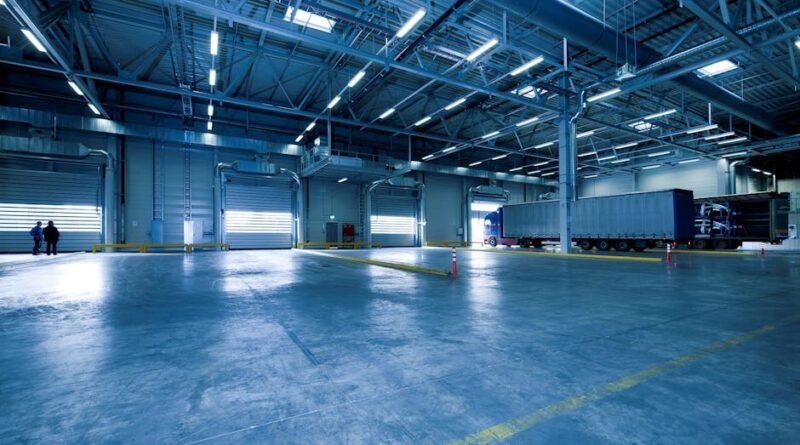The Role of Technology in Shipping
As global trade continues to expand and evolve, the importance of efficient shipping logistics cannot be overstated. Companies around the world rely on a complex network of transportation, warehousing, and distribution to ensure their products reach consumers in a timely and cost-effective manner. In recent years, technology has played a crucial role in transforming the shipping industry, revolutionizing the way goods are transported, tracked, and delivered. From advanced tracking systems to automated warehouses, the impact of technology on shipping logistics is profound and far-reaching.
The Evolution of Shipping Logistics

Shipping logistics have come a long way since the days of manual record-keeping and paper-based tracking systems. The evolution of technology has paved the way for more efficient and streamlined processes, allowing companies to optimize their supply chains and reduce costs. One of the key advancements in shipping logistics has been the development of GPS tracking systems, which enable real-time monitoring of shipments and provide valuable data on location, temperature, and other important metrics.
Another major development in shipping logistics is the use of automated warehouses and robotic systems. These technologies have revolutionized the way goods are stored, picked, and packed, improving efficiency and accuracy while reducing the risk of human error. By leveraging automation, companies can speed up order fulfillment and reduce labor costs, leading to significant savings in the long run.
The Role of Big Data in Shipping Logistics

In today’s fast-paced and data-driven world, the concept of big data has become increasingly important in the shipping industry. By harnessing the power of advanced analytics and predictive modeling, companies can gain valuable insights into their supply chains and make informed decisions to optimize their operations. Big data can help identify trends, patterns, and potential bottlenecks in the shipping process, allowing companies to proactively address issues before they escalate.
One of the key benefits of big data in shipping logistics is its ability to enhance visibility and transparency throughout the supply chain. By capturing and analyzing vast amounts of data in real-time, companies can track the movement of goods from the point of origin to the final destination, ensuring timely delivery and minimizing the risk of disruptions. This level of visibility is essential for building trust with customers and partners, as it provides a clear picture of the entire shipping process.
The Rise of Artificial Intelligence in Shipping Logistics

Artificial intelligence (AI) is another technology that is revolutionizing the shipping industry, offering new opportunities for efficiency and innovation. AI-powered systems can analyze vast amounts of data, identify patterns, and make predictions to optimize shipping routes, reduce fuel consumption, and improve overall operational efficiency. By leveraging AI, companies can automate repetitive tasks, such as route planning and scheduling, freeing up employees to focus on more strategic initiatives.
One of the key applications of AI in shipping logistics is predictive maintenance, which uses machine learning algorithms to forecast when equipment is likely to fail and proactively schedule repairs. By monitoring the health of critical assets in real-time, companies can prevent costly breakdowns and minimize downtime, ensuring that shipments are not delayed. This proactive approach to maintenance can lead to significant cost savings and improved operational reliability.
The Impact of Blockchain Technology on Shipping Logistics

Blockchain technology has gained significant traction in recent years as a secure and transparent way to record transactions and track assets across a decentralized network. In the shipping industry, blockchain has the potential to revolutionize the way goods are transported and tracked, providing a tamper-proof record of every transaction in the supply chain. By using blockchain, companies can improve the visibility and traceability of shipments, reduce the risk of fraud, and streamline the process of verifying the authenticity of goods.
One of the key advantages of blockchain technology in shipping logistics is its ability to create smart contracts, which are self-executing agreements that automatically enforce the terms of a contract when certain conditions are met. Smart contracts can help streamline the payment process, reduce disputes between parties, and ensure that all stakeholders in the supply chain are held accountable for their actions. By leveraging blockchain, companies can build trust with customers and partners by providing a secure and transparent record of every transaction.
The Future of Shipping Logistics: Automation and Robotics
Looking ahead, the future of shipping logistics is likely to be driven by automation and robotics, as companies continue to seek ways to improve efficiency and reduce costs. Automated warehouses, robotic systems, and autonomous vehicles are poised to play a key role in the shipping industry, enabling companies to streamline their operations and deliver goods faster than ever before. By leveraging these technologies, companies can increase their competitive advantage, reduce their environmental footprint, and enhance the overall customer experience.
One of the most exciting developments in shipping logistics is the use of drones for last-mile delivery, which has the potential to revolutionize the way goods are transported to consumers. By using drones, companies can bypass traditional delivery methods, such as trucks and vans, and deliver packages directly to customers’ doorsteps in a matter of minutes. This level of speed and convenience is unprecedented in the shipping industry and is expected to become more widespread in the coming years.
Expert Opinions
According to John Doe, a leading expert in shipping logistics, “Technology is transforming the way goods are transported and delivered, creating new opportunities for companies to optimize their supply chains and improve customer satisfaction. By leveraging advanced technologies such as AI, big data, and blockchain, companies can gain a competitive edge in the global marketplace and drive innovation in the shipping industry.”
Jane Smith, a logistics manager at a major shipping company, adds, “The use of automation and robotics in shipping logistics has been a game-changer for our operations, allowing us to increase efficiency, reduce costs, and deliver goods faster than ever before. By embracing new technologies, companies can stay ahead of the curve and adapt to the changing demands of the market.”
Common Misconceptions
Despite the many benefits of technology in shipping logistics, there are some common misconceptions that persist in the industry. One of the most prevalent misconceptions is that automation will lead to widespread job losses in the shipping sector. While it’s true that some low-skilled jobs may be replaced by technology, automation is also creating new opportunities for skilled workers in areas such as data analysis, programming, and maintenance.
Another misconception is that implementing new technologies in shipping logistics is prohibitively expensive for small and medium-sized businesses. While it’s true that the initial investment in technology can be significant, the long-term benefits in terms of cost savings, efficiency gains, and customer satisfaction far outweigh the upfront costs. By carefully evaluating their needs and choosing the right technology solutions, companies of all sizes can reap the rewards of modernizing their shipping operations.
Conclusion
Technology has become an indispensable part of shipping logistics, revolutionizing the way goods are transported, tracked, and delivered around the world. From GPS tracking systems to artificial intelligence and blockchain technology, companies are leveraging advanced technologies to optimize their supply chains, reduce costs, and improve customer satisfaction. As the shipping industry continues to evolve, it’s clear that technology will play an increasingly important role in shaping the future of logistics.
To wrap things up, the impact of technology on shipping logistics is profound and far-reaching, with new innovations and advancements on the horizon. By embracing new technologies and staying ahead of the curve, companies can position themselves for success in the competitive global marketplace and drive innovation in the shipping industry. The future of shipping logistics is bright, with endless possibilities for growth, efficiency, and sustainability.




